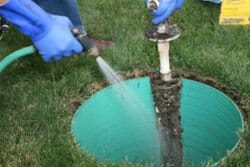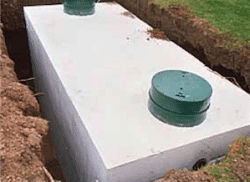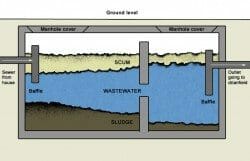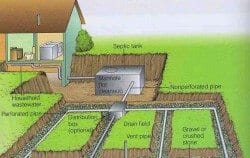Septic Tank Filter: Does Yours Have One & Where Is It?
Home » Plumbing » Septic Tanks & Leach Fields »
First, not all septic tanks have a filter, especially the older septic tanks. Now many government agencies require or recommend a filter when a septic tank is installed.
Cleaning a septic tank filter is different than pumping out a septic tank and cleaning it.
A Septic tank filter
Filters are usually located in the septic tank near the end where the effluents leave the tank and flow to the leach field. A filter will help trap small particles of suspended solids and particle matter that was not caught in the portion of the tank where the majority of the sludge and scum is found.
Basically, a filter helps reduce the particulate matter and suspended solids before they enter the leach field.

Filters extends the life and efficiency of a leach field
The filter will reduce clogging of a drain field and helps increase the efficiency of the field. Overall the life expectancy of a septic leach field may be 10 to 20 years, with some lasting longer, i.e. 30 years, with proper maintenance and good soil for percolation. Septic tanks may last 40 years +/-. This is one of the reasons many localities want a second leach filed area identified on plans before they will issue a permit.
Septic failure or slow draining sinks and toilets may be related to a filter issue
If a filter is clogged or partially clogged, it may not be letting the effluent water from the tank flow into the drain (leach) field. Then the tank and sewer line may not drain properly and back-up. Signs may include toilets backing up and slow draining sinks.
How often should you clean a septic filter?
This varies from system to system, type of filter and usage. There are those who say each time you have the tank pumped you have the filter cleaned. Many septic companies automatically do this as part of their service. However, if you start out checking your filter in six months after you first installed it or after the first pumping of the tank of a home you bought, and it is pretty clean, then you might try going a year and then checking it. Over a period of years you will be able to determine what is the best cleaning schedule for your particular circumstances.
How often should you pump out a septic tank?
The answer varies; it generally falls between 2 and 5 years, with most systems needing to be pumped every 3 or 4 years. The reason it varies so much is that there are many variables. The size of the tank, the family size living in the home, the dietary and cooking habits of the family (i.e. do they use a lot of oils and grease), do they have a garbage disposal that they use a lot.




I have a septic system installed in 1960, where would my filter be located
If you have a plumber say the septic tank needs to be hydro blasted when it’s backing up is that a cure or a bad idea using water to blast water doesn’t seem logical
What filter is recommended for a flow of 10 000 gpd and reduction f suspended solids from 35 mg/ l to 20-25 mg/l with gravity flow. Thank you.
allow I need a septic tank filter do you have one please